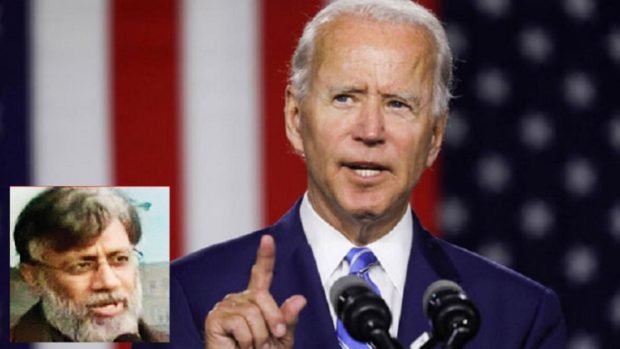
Certify India’s request to extradite Tahawwur Rana: Biden admin to US court
PTI, Mar 23, 2021, 8:28 AM IST

Washington DC: The Biden administration has urged a federal court to certify India’s request to extradite Pakistani-origin Canadian businessman Tahawwur Rana, who is sought for his involvement in the 2008 Mumbai terror attack.
Assistant US Attorney John J Lulejian, in his submission before a federal US court in Los Angeles, said Rana, 59, meets all the criteria to be extradited to India for his trial in the Mumbai attack case.
On February 4, Rana’s attorney had opposed his extradition.
US District Court Judge in Los Angeles Jacqueline Chooljian has scheduled the extradition hearing for April 22.
”The United States respectfully requests that following the April 22, 2021, extradition hearing, the Court certify India’s request for Rana’s extradition for the Secretary of State’s surrender decision,” Lulejian said in his 61-page court submission on Monday.
Rana, a childhood friend of David Coleman Headley, was re-arrested on June 10 in Los Angeles on an extradition request by India for his involvement in the Mumbai terror attack in which 166 people, including six Americans, were killed. He has been declared a fugitive by India.
”Fugitive Tahawwur Hussain Rana is wanted in India to stand trial for offences related to his role in the 2008 terrorist attacks in Mumbai, India, that resulted in the death of 166 people, the injury of 239 people, and the damage to property in excess of USD 1.5 billion,” Lulejian said.
As per the India-US Extradition Treaty, the Indian government has requested the formal extradition of Rana, and the United States has initiated this extradition proceeding.
Lulejian said the criteria warranting certification of extradition are satisfied in this case.
These are: the court has both personal and subject matter jurisdiction, there is an extradition treaty between the United States and India that is in full force and effect, and the crimes for which Rana’s extradition is sought are covered by the terms of the treaty.
India’s extradition request contains evidence to establish probable cause that the individual appearing in court is the fugitive who committed the offence for which extradition is requested, Lulejian argued.
In his court submission on February 4, Rana’s attorney had argued that Rana’s extradition is barred under Article 6 of the United States-India extradition treaty because he had previously been acquitted of the offences for which his extradition is sought, and under Article 9 of the treaty because the government has not established probable cause to believe that Rana committed the alleged offences.
Lulejian said that the court should find that Rana’s extradition is not barred under Article 6 of the India-US Extradition Treaty. Although there is ample evidence that Rana aided and abetted the Mumbai attack, he claims that he should not be extradited because probable cause is lacking. Rana’s claim is based on an improper attempt to attack the credibility of a key witness against him.
Rana also does not contest that he is the person who India alleges committed the charged crimes. Instead, he challenges only whether Article 6 of the treaty bars his extradition and whether probable cause exists to believe that he committed the offences for which India requests his extradition, the Assistant US Attorney said.
Lulejian said Headley’s plea agreement is irrelevant because Rana cannot benefit from its terms. Not only is Rana in a different position than Headley because he did not plead guilty or cooperate with the United States, as is his right, but his inability to benefit from the negotiated terms of Headley’s plea agreement is confirmed by the text of the plea agreement itself.
He said Rana’s extradition proceedings are separate from Headley’s criminal proceedings and are being litigated by a different United States attorney’s office from the one who negotiated the plea agreement with Headley.
According to its very terms, Rana has no rights under Headley’s plea agreement and is therefore prohibited from relying on it in an attempt to undermine the United States’ position on his extraditability under the treaty, he added.
”Rana has failed to demonstrate that he cannot be extradited to India as a result of his prior prosecution in the United States,” the attorney said.
Rana attempts to undermine India’s evidence of probable cause by questioning the credibility of the key witness, David Headley. Not only is Rana’s challenge improper in this extradition proceeding, but his claims are also not supported by the law or the evidence, Lulejian said.
Udayavani is now on Telegram. Click here to join our channel and stay updated with the latest news.
Top News

Related Articles More

China approves world’s largest dam over Brahmaputra river close to Indian border

Intruder killed along India-Pakistan border in Rajasthan

Kazakhstan says 42 people likely dead in Azerbaijan Airlines’ plane crash

Killed in Russia-Ukraine war six months ago, UP man’s body brought back home

‘We should try again’: Punjab Assembly Speaker on Vajpayee’s failed India-Pak peace initiative
MUST WATCH
Latest Additions

Former PM Dr. Manmohan Singh passes away at 92

Contractor dies by suicide, alleges Minister Priyank Kharge’s aide responsible

Cricket match to crime: Five minors held for armed robbery in Delhi

Priyanka slams BJP over heckling of singer who sang Mahatma Gandhi’s favourite ‘bhajan’

Parliament’s Waqf panel dissatisfied with responses from Karnataka, MP, Rajasthan
Thanks for visiting Udayavani
You seem to have an Ad Blocker on.
To continue reading, please turn it off or whitelist Udayavani.





















